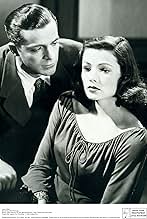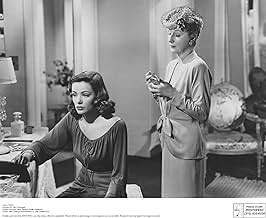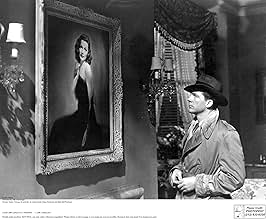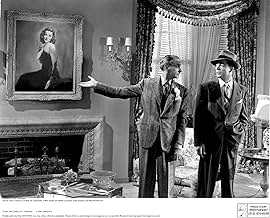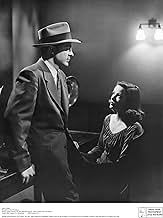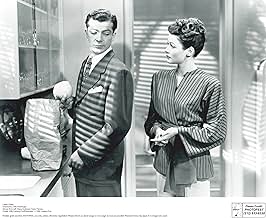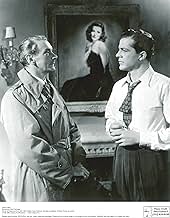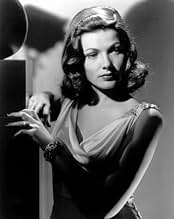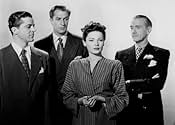PUNTUACIÓN EN IMDb
7,9/10
54 mil
TU PUNTUACIÓN
Un detective de la policía se enamora de la mujer cuyo asesinato está investigando.Un detective de la policía se enamora de la mujer cuyo asesinato está investigando.Un detective de la policía se enamora de la mujer cuyo asesinato está investigando.
- Dirección
- Guión
- Reparto principal
- Ganó 1 premio Óscar
- 7 premios y 5 nominaciones en total
Grant Mitchell
- Lancaster Corey
- (escenas eliminadas)
Dorothy Adams
- Bessie Clary - Laura's Maid
- (sin acreditar)
Terry Adams
- Woman
- (sin acreditar)
John Alban
- Executive
- (sin acreditar)
Wally Albright
- Newsboy
- (sin acreditar)
Bobby Barber
- Newsboy
- (sin acreditar)
Edward Biby
- Party Guest
- (sin acreditar)
Gary Breckner
- Narrator
- (sin acreditar)
James Carlisle
- Party Guest
- (sin acreditar)
Harry Carter
- Party Guest
- (sin acreditar)
Lane Chandler
- Detective
- (sin acreditar)
Bill Chaney
- Newsboy
- (sin acreditar)
Dorothy Christy
- Woman
- (sin acreditar)
Reseñas destacadas
I'm not sure if "Laura" truly qualifies as a film noir, although it certainly looks the part. If anything, it is a bridge between the standard romantic dramas of the '30s and '40s and the far darker truly noir films, such as "Double Indemnity," in which the main characters are either weak, desperate, or truly evil.
Tierney, here, is luminous as always, but hardly unsympathetic. And Andrews is your basic Dick Tracy -- colorless, but solid and honest. It's no surprise then that Webb walks off with the film, but his character is significant in other ways. Outwardly fey, Waldo is a variation on the stock "gay" Hollywood character seen at a time when homosexuality was hinted at but never really acknowledged. He insists he loves Laura, but there appears to be no actual love affair. He chooses her clothes and hairstyles, shows her off on his arm, but never seems to have any real physical contact with her. (The visual clue is his apartment, filled with pretty things that no one is allowed to touch, although Waldo will gladly tell you how expensive they are.) His scenes with Andrews become far more complex in this context, particularly when he discusses the case with the detective from his bath. Their verbal sparring continues throughout the film, and Webb makes frequent remarks about why women find Andrews' type so alluring, while they reject more "refined" males of taste and breeding. But Webb's Waldo, despite the refinement, is a catty and cruel little monster, a man who writes of love, but has none in his life. Unlike David Wayne's comic sissy in "Adam's Rib," who repeatedly proclaims his love and adoration for Katharine Hepburn's Amanda, Webb's Waldo has an edge so vile that we fear him, and, because of that, can accept him as a suspect.
The film is also notable for Vincent Price's performance as a needy boy-toy who is manlier than Webb, but still sexually vague, indecisive and weak. Viewers unaccustomed to seeing Price in such roles may think he was miscast. Perhaps he was, but he seems to be doing precisely what he was supposed to do, giving Laura another worldly but inappropriate suitor.
The plot, predictable or not, is great fun; a bit of a whodunit with a psychological edge. The score is legendary, and like the painting Andrews falls in love with, the music gives the film its haunting quality, particularly at those moments when we segue into another flashback.
There's a bit of inscrutability in most of Tierney's performances, which makes her perfect for this role. We rarely know what she's thinking, or precisely how she feels about the other characters. And because of this, her flashbacks provide few clues as to why anyone would want to murder her.
There are a few other suspects, of course, including the great Judith Anderson, and there's even a smart little cocktail party where you can look them over one more time. As for who really did kill Laura -- well, good luck with that one.
Tierney, here, is luminous as always, but hardly unsympathetic. And Andrews is your basic Dick Tracy -- colorless, but solid and honest. It's no surprise then that Webb walks off with the film, but his character is significant in other ways. Outwardly fey, Waldo is a variation on the stock "gay" Hollywood character seen at a time when homosexuality was hinted at but never really acknowledged. He insists he loves Laura, but there appears to be no actual love affair. He chooses her clothes and hairstyles, shows her off on his arm, but never seems to have any real physical contact with her. (The visual clue is his apartment, filled with pretty things that no one is allowed to touch, although Waldo will gladly tell you how expensive they are.) His scenes with Andrews become far more complex in this context, particularly when he discusses the case with the detective from his bath. Their verbal sparring continues throughout the film, and Webb makes frequent remarks about why women find Andrews' type so alluring, while they reject more "refined" males of taste and breeding. But Webb's Waldo, despite the refinement, is a catty and cruel little monster, a man who writes of love, but has none in his life. Unlike David Wayne's comic sissy in "Adam's Rib," who repeatedly proclaims his love and adoration for Katharine Hepburn's Amanda, Webb's Waldo has an edge so vile that we fear him, and, because of that, can accept him as a suspect.
The film is also notable for Vincent Price's performance as a needy boy-toy who is manlier than Webb, but still sexually vague, indecisive and weak. Viewers unaccustomed to seeing Price in such roles may think he was miscast. Perhaps he was, but he seems to be doing precisely what he was supposed to do, giving Laura another worldly but inappropriate suitor.
The plot, predictable or not, is great fun; a bit of a whodunit with a psychological edge. The score is legendary, and like the painting Andrews falls in love with, the music gives the film its haunting quality, particularly at those moments when we segue into another flashback.
There's a bit of inscrutability in most of Tierney's performances, which makes her perfect for this role. We rarely know what she's thinking, or precisely how she feels about the other characters. And because of this, her flashbacks provide few clues as to why anyone would want to murder her.
There are a few other suspects, of course, including the great Judith Anderson, and there's even a smart little cocktail party where you can look them over one more time. As for who really did kill Laura -- well, good luck with that one.
The first time I saw this film, about eight years ago I ended up almost losing a friend because I was hoarding the VHS copy he had lent me for about two months. After seeing it, I quite simply didn't want to give up the tape because in doing so, I wouldn't be able to watch it anytime I wanted to; and I did watch it anytime I wanted to, and often, until he threatened to call a Noir Intervention. I may have loved this film from the first viewing, but I wasn't prepared to deal with something like that, as entertaining as it may have been.
I fell in love with `Laura' because it is biting and evil, intelligent and surprising. The unfathomably gorgeous Gene Tierney plays the title character, an advertising executive whose best friend Waldo Lydecker (played by the always wonderful Clifton Webb) and fiancée Shelby, (a really young Vincent Price) are some of the prime suspects in her murder. The gruff detective leading the case (Dana Andrews) is Det. McPherson, and he quickly essentially falls in love with a ghost while he is trying to solve her murder.
`Laura' has one of the great Noir scripts in that just as the audience thinks they have the case solved, another curve ball is thrown at them which blows that theory out of the water. The acting is pure delightful melodrama, but Clifton Webb's performance is simply show-stopping. His character is a vicious snit of a writer who uses his column as a weapon against anyone he doesn't like or even tolerate. Even upon multiple viewings I can't help but howl at some of his lines and mannerisms.
If anyone was to request suggestions for good Film Noir movies, I would prescribe a heavy dose of `Laura' because it has something for everyone in that it is romantic, thrilling, mysterious, wickedly funny and above all, thoroughly entertaining.
--Shelly
I fell in love with `Laura' because it is biting and evil, intelligent and surprising. The unfathomably gorgeous Gene Tierney plays the title character, an advertising executive whose best friend Waldo Lydecker (played by the always wonderful Clifton Webb) and fiancée Shelby, (a really young Vincent Price) are some of the prime suspects in her murder. The gruff detective leading the case (Dana Andrews) is Det. McPherson, and he quickly essentially falls in love with a ghost while he is trying to solve her murder.
`Laura' has one of the great Noir scripts in that just as the audience thinks they have the case solved, another curve ball is thrown at them which blows that theory out of the water. The acting is pure delightful melodrama, but Clifton Webb's performance is simply show-stopping. His character is a vicious snit of a writer who uses his column as a weapon against anyone he doesn't like or even tolerate. Even upon multiple viewings I can't help but howl at some of his lines and mannerisms.
If anyone was to request suggestions for good Film Noir movies, I would prescribe a heavy dose of `Laura' because it has something for everyone in that it is romantic, thrilling, mysterious, wickedly funny and above all, thoroughly entertaining.
--Shelly
A superbly stylish movie. None of its characters is without flaws - even the elusive Laura is too naive for her own good. They are presented lovingly by Preminger, and his award-winning DOP Joseph LaShelle.
The excellent script ranges from caustic Laedecker/Webb put-downs, through brutal Treadwell/Anderson self-assessment, to laconic MacPherson/Andrews minimalism.
The score is, of course, a classic. Raksin's sinuous melody, brilliantly deployed, haunts the picture as powerfully as Laura's portrait haunts Detective MacPherson.
The central performances are wonderful, not least because of the perfect casting. Tierney shines as the enigmatic title character: beautiful, intelligent, somehow both cool and passionate at the same time. Webb dazzles, Price slithers, Anderson simmers. Best of all is Andrews as the detective who barely opens his mouth when he speaks, and on whose face desire barely flickers - but he does enough to show you exactly what he wants and how he feels. It's a great movie performance from an underrated actor. Only Dorothy Adams doesn't quite fit, in a role - Laura's maid - that could easily have been as showy as the others with the right performer.
LAURA doesn't appear to be about anything significant, but it leaves behind it a feeling that it is greater than the sum of its parts. I don't know how this was managed, and perhaps no-one involved in it did either. It's one of those movies where everything just clicked. Seeing it again recently, after many years, confirms its status for me as a significant work, but exactly why or how remains as much of a puzzle as Laura herself.
The excellent script ranges from caustic Laedecker/Webb put-downs, through brutal Treadwell/Anderson self-assessment, to laconic MacPherson/Andrews minimalism.
The score is, of course, a classic. Raksin's sinuous melody, brilliantly deployed, haunts the picture as powerfully as Laura's portrait haunts Detective MacPherson.
The central performances are wonderful, not least because of the perfect casting. Tierney shines as the enigmatic title character: beautiful, intelligent, somehow both cool and passionate at the same time. Webb dazzles, Price slithers, Anderson simmers. Best of all is Andrews as the detective who barely opens his mouth when he speaks, and on whose face desire barely flickers - but he does enough to show you exactly what he wants and how he feels. It's a great movie performance from an underrated actor. Only Dorothy Adams doesn't quite fit, in a role - Laura's maid - that could easily have been as showy as the others with the right performer.
LAURA doesn't appear to be about anything significant, but it leaves behind it a feeling that it is greater than the sum of its parts. I don't know how this was managed, and perhaps no-one involved in it did either. It's one of those movies where everything just clicked. Seeing it again recently, after many years, confirms its status for me as a significant work, but exactly why or how remains as much of a puzzle as Laura herself.
Laura A definitive film noir classic, and simply put my favorite film of all time. Laura tells the shocking story of Park Avenue society beauty, Laura Hunt ( Gene Tierney) who is murdered in her apartment, which brings Detective Mark McPherson ( Dana Andrews) to New York's most elegant neighborhood to investigate. As he tried to get inside the head of the victim, he also questions the men in her life-the acerbic critic Waldo Lydecker ( Clifton Webb) and her playboy fiancé Shelby Carpenter ( Vincent Price). But who would have wanted to kill a girl with whom every man she met seemed to fall in love? Fueled by her stunning portrait, liquor and classical music, McPherson quickly finds himself falling under her spell too. A police detective falling in love with the woman whose murder he's investigating? Then in one stormy night, halfway through his investigation, something so bizarre happens to him, that he is forced to re-think the whole case.
This reveal still kind of leaves me guessing. Is it all a dream? Or maybe it is all formulated by the ' spell' of the movie. An alluring cast and no doubt the famous musical theme by David Raksin has something to do with it.
There are so many scenes I could count as my favorite but, the one that always stands out to me is the scene where McPherson falls asleep under the portrait and he awakes with the sudden appearance of a woman who seems to be Laura Hunt herself!, dressed in a drenched trenchcoat. This entire scene is fuelled with more sexuality than Hollywood Studios these days can ever dream of in their bids to put two stars together.
Another scene I love is when McPherson slugs Carpenter in the stomach. " It's too bad. You didn't open up that door Friday night." I'm not kind, I'm vicious. It's the secret of my charm." "You'd better watch out, McPherson, or you'll finish up in a psychiatric ward. I doubt they've ever had a patient who fell in love with a corpse." "People are always ready to hold out a hand to slap you down, but never to pick you up." "Waldo, why are you doing this?" "For you, Laura." "I was 99 percent certain about you.... but I had to get rid of that one percent doubt."
This reveal still kind of leaves me guessing. Is it all a dream? Or maybe it is all formulated by the ' spell' of the movie. An alluring cast and no doubt the famous musical theme by David Raksin has something to do with it.
There are so many scenes I could count as my favorite but, the one that always stands out to me is the scene where McPherson falls asleep under the portrait and he awakes with the sudden appearance of a woman who seems to be Laura Hunt herself!, dressed in a drenched trenchcoat. This entire scene is fuelled with more sexuality than Hollywood Studios these days can ever dream of in their bids to put two stars together.
Another scene I love is when McPherson slugs Carpenter in the stomach. " It's too bad. You didn't open up that door Friday night." I'm not kind, I'm vicious. It's the secret of my charm." "You'd better watch out, McPherson, or you'll finish up in a psychiatric ward. I doubt they've ever had a patient who fell in love with a corpse." "People are always ready to hold out a hand to slap you down, but never to pick you up." "Waldo, why are you doing this?" "For you, Laura." "I was 99 percent certain about you.... but I had to get rid of that one percent doubt."
Laura is a wonderful example of film noir. The cast is perfect. Dana Andrews is the detective assigned to investigate the murder of Laura (played by Gene Tierney). As he interviews her associates and becomes mesmerized by her portrait, he begins to fall for Laura posthumously. Clifton Webb plays her mentor perfectly and Vincent Price is classic as Laura's pretty boy fiance. Although the movie begins with Laura's murder, it still has incredible surprises and an awesome denouement. Andrews hard boiled detective and the dark, raining sets illustrate the meaning of film noir. I highly recommend it.
¿Sabías que...?
- CuriosidadesAccording to Producer and Director Otto Preminger, he had to work to win the respect of the cast, who all seemed "hostile" to him when he took over, with the exception of Clifton Webb. "I learned later", he said, "that Mamoulian had called each of them individually and warned them that I did not like their acting and intended to fire them." It was not true. Dame Judith Anderson decided to confront him on the set. She said that if he wasn't happy with her performance, then he should show her how to make it better.
- PifiasIn the initial long-shot when McPherson and Lydecker are out to dinner, McPherson's chair is unoccupied (about 15:28). When the camera is at their table, McPherson has materialized.
- Citas
Waldo Lydecker: I don't use a pen. I write with a goose quill dipped in venom.
- Versiones alternativasA scene cut from the theatrical version after its initial release was restored to the film in 1990. In it, Waldo Lydecker described how he transformed Laura's appearance and introduced her to high society. The studio worried that this obsession with decadent luxury would be offensive to WWII soldiers serving overseas, so the scene was deleted.
- ConexionesFeatured in Vicki (1953)
Selecciones populares
Inicia sesión para calificar y añadir a tu lista para recibir recomendaciones personalizadas
- How long is Laura?Con tecnología de Alexa
- What is 'Laura' about?
- Is 'Laura' based on a book?
- How does the movie end?
Detalles
Taquilla
- Presupuesto
- 1.020.000 US$ (estimación)
- Recaudación en todo el mundo
- 1356 US$
- Duración1 hora 28 minutos
- Color
- Relación de aspecto
- 1.37 : 1
Contribuir a esta página
Sugerir un cambio o añadir el contenido que falta



